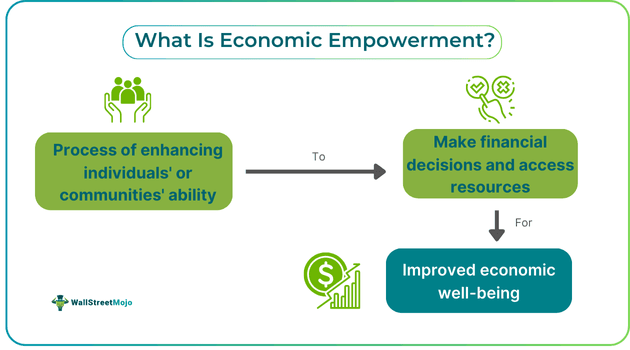Table of Contents
What Is Economic Empowerment?
Economic empowerment refers to the capability of a person to make a decision involving the control and allocation of funds and financial resources of a household. It instills power in people to make selections that will benefit their societies, lives, and communities and also resolve gender inequalities.

It helps alleviate poverty, promotes entrepreneurship, and leads to financial inclusion. It is widely applied in providing universal social protection schemes so that everyone has easy access to education and healthcare. It has an overall improving effect on individual well-being, society, gender equality, and resilience in turmoil.
Key Takeaways
- Economic empowerment is the ability of an individual to make decisions concerning the management and distribution of finances and household income.
- It allows people to make decisions to improve their societies, communities and lives while simultaneously resolving gender inequality.
- It can be measured through financial decision-making ability, access to funds, financial independence, financial literacy, social position, and control over household finances.
- It's important for achieving the UN Sustainable Development Goals, enhanced social inclusion, promoting education, increased autonomy,
- Better education, sustainable development, poverty reduction, increased economic participation, and improved health and well-being.
Economic Empowerment Explained
Economic empowerment for women or black economic empowerment can be stated as the process of fulfilling a marginalized person's equal reach and control over financial resources so that they can improve their livelihood. In this way, they can make their own decisions, use the opportunity, and be independent to contribute heavily to the growth and development of their society and communities. Its prime example is that of South Africa's black economic empowerment using broad-based black economic empowerment.
It works by removing barriers that prohibit marginalized people from participating fully in economic growth. It does this by transforming a person's self-esteem, knowledge, and capability through institutes like Visa's economic empowerment institute, the behavior and norms of a society and communities, value chains, markets, and the wider legal and political environment. It uses easy access to finances, entrepreneurship support, skills development, implementing social protection programs, and promoting gender equality to achieve the stated objectives.
It has various implications, like promoting sustainable development, reducing poverty, improving gender equality, and leading to social and financial inclusion. Moreover, it has successfully improved women's economic status and participation in economic activity in their household and society in terms of decision-making, as well as enhanced healthcare and social status. As it expands economic activity participation and access to marginalized sections, especially women, it has ushered into new financial products, services, and innovation to address these factors. It has also led to just and fair wealth distributions by addressing income discrepancies in an equitable and inclusive financial system.
How To Measure?
It can be measured using various indicators as listed below:
- Power to make financial decisions like business activities, household savings, income, and expenditures.
- The ability of people to have good access to money which they can spend easily outside of household needs.
- Presence of financial independence where one is independent of their spouse or partner or other for money.
- I know financial systems and do financial transactions, including access to financial services like credit and bank accounts.
- Economic position indicators within society, such as employment, household assets, income level, and property ownership, are used.
- Factors restraining the social position like movement restrictions, absence of childcare support, and partner violence.
Examples
Let us use a few examples to understand the topic.
Example #1
An online article published on May 17, 2024, discusses an economic empowerment forum held in Lansing at the REO Town Train Depot. Business leaders and lawmakers came together to emphasize the importance of financial literacy—the event aimed to enhance knowledge and understanding of financial education within the community. Key discussions focused on how community members can engage in financial education initiatives. Joe Garcia, CEO of St. Vincent Catholic Charities, highlighted the need for ongoing dialogue and the formation of adaptable partnerships to maintain relevance in the community.
Example #2
Let us assume Tamina works as a waitperson and part-time childcare service provider for long hours to meet her ends. Since she was struggling with managing her finances, she joined a non-profit organization offering financial literacy for free. The organization taught her to make budgets and negotiate salary hikes skillfully and also made her invest in becoming a certified coder.
Hence, Tamina's newly gained skills helped her get a good remote job with flexible hours and high pay. Her economic empowerment improved her spending power, added financial help to her household, decreased her tension and stress, and helped her become a coding entrepreneur.
Importance
It has a lot of importance in daily as well as social life, as mentioned below:
- It helps reduce poverty through stable incomes, improved standards of living, and breaking the cycle of poverty.
- It facilitates the participation of other poor in economic development and growth for job creation and increased empowerment.
- It offers better health and welfare to economically empowered people due to access to nutritious foods and healthcare.
- It removes economic and gender disparity, creating a more just, equitable, and inclusive society.
- It enables greater decision-making authority and autonomy of economically empowered persons in the household and society, promoting balanced and happy relationships.
- It provides gateways to education, training, and skills to enhance knowledge to get employment and career enhancement.
- Several United Nations Sustainable Development Goals (SDGs) use it as a key tool for sustainable development by working on gender equality promotion, poverty reduction, and decent work.
